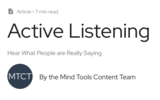
This article provides suggestions for how to improve your active listening skills -- and that you could use with your students.
- Subject:
- Professional Learning
- Material Type:
- Reading
- Author:
- MindTools
- Date Added:
- 06/08/2023

This article provides suggestions for how to improve your active listening skills -- and that you could use with your students.
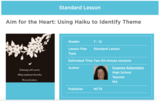
Less can often be more—especially as students explore the theme of a work of literature through analytical writing. Writing haiku offers a student in the final draft stages of a paper an innovative way to determine if the paper says what he/she means it to say. Students can “lose their way” when writing analytical papers, resulting in wordy, tangled papers with the thesis obscured. To alleviate this problem, students create haiku that, in seventeen syllables, encapsulate the heart of the paper. Because of its brevity, haiku promotes clarity of thought. It further challenges students to work on focused revision.
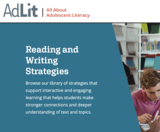
This website is a compilation of fantastic resources for any reading teacher. This page on the website provides a brief overview of before, during, and after reading strategies, as well as links with detailed information about a variety of strategies and downloadable resources for the classroom. They also provide recommended additional reading for interested viewers.
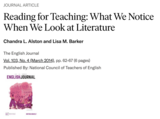
This article explains how teachers can read texts through the lens of preparing to teach the text and provides a model for reading as a teacher.
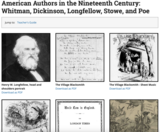
This primary source set includes documents and images from the lives of American authors in the 19th century. A teacher guide is included to assist educators in utilizing the primary sources in their instruction.
This lesson extends over several class periods. Students analyze the claim, grounds, warrants, qualifiers and counterclaims in three articles about the American Dream. Students conduct research and find two additional articles about the American Dream. Students then analyze the argument in those articles. Finally, students write their own argument essay about the current state of the American Dream.
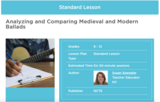
Students explore the ballads genre by reading medieval ballads to deduce their characteristics, acting out the ballads, comparing medieval and modern ballads using Venn diagrams, and composing their own ballads.
Grades 2 & 3Discuss different types of mediums used for illustrations.Each student will create a sample paper using the mediums available.Students will create an artifact using a holiday or historical event as a theme and/or students will match illustrations with the type of medium used.
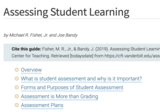
From Vanderbilt’s Center for Teaching, this web site offers an overview of key terms and principles about assessment and its role in teaching and learning. It includes discussion of different methods and how to make plans for assessment.
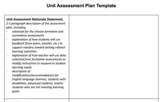
You may download and complete this template to fulfill the requirements for Evidence of Preparation and Planning.
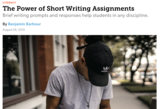
As teachers need to consider long and short writing, formal and informal, in a variety of genres, this article focuses on and gives examples of short writing tasks that can still help students explore learning and write effectively.
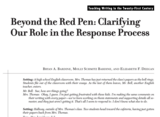
In this English Journal article, Bardine et al. apply research on teacher commenting practices (e.g., appearance comments vs. function comments) to the experiences of student writers in the secondary English classroom. They offer suggestions about how to use comments and response to writing more effectively to support student learning in the classroom.

This website provides class discussion strategies grouped by higher-prep, low-prep, and ongoing strategies.

Students will capture their own images to promote or recommend a book from their personal reading. This assignment is designed to blend principles from digital photography, design, and library media standards to demonstrate deeper understanding and critical thinking skills. This lesson plan was created by Andrea Settle then remixed by Melissa Jensen.Image: "Student Photographer" by Melissa Jensen is licensed under CC BY-NC-SA 2.0

This website includes text, images, and video instruction in the principles of backwards design. The material provides an overview of these principles as well as different stages to help teachers work through in their plans and templates they can use.
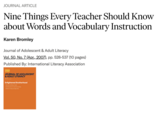
This article provides nine research-based elements of vocabulary instruction that can guide teachers thinking about the way they approach word study in their curriculum.

In this English Journal article, Chanski and Ellis discuss a teacher inquiry project that took place in an AP English class where the teacher supported students in learning to give meaningful peer evaluation to each other’s writing. They describe strategies that make the experience meaningful for student writers.
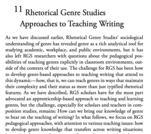
The book in its whole provides a thorough and accessible approach to understanding genre and its application in classrooms. Chapter 11 explains applications to teaching.
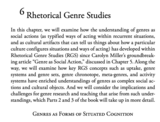
The book in its whole provides a thorough and accessible approach to understanding genre and its application in classrooms. Chapter 6 focuses on the rhetorical understanding of genre.
This set of lessons extends over several weeks and incorporates all acts of Arthur Miller's play, The Crucible. Students will closely read The Crucible. Students will cite textual evidence and make interpretations about character development.Students will combine the textual evidence with their interpretations and write interpretive statements. In the culminating activity, students will write a character analysis.